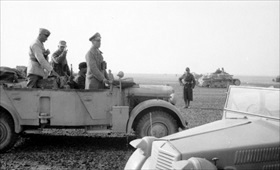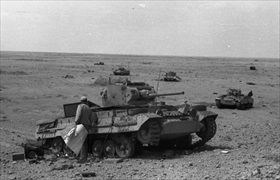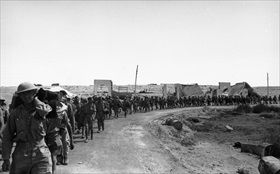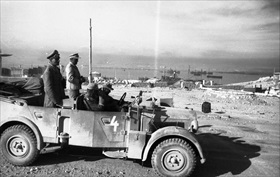ROMMEL ROUTS BRITISH, TAKES TOBRUK STRONGHOLD
Cairo, Egypt · June 21, 1942
After a disorderly retreat by the British Eighth Army into Egypt following Erwin Rommel’s breakthrough of the Gazala Line in mid-June, the Desert Fox (Rommel’s popular nickname) stormed the British-held Mediterranean fortress and harbor of Tobruk in Eastern Libya on this date in 1942. The newly minted German field marshal seized huge quantities of ammunition, 5,000 tons of rations, 2,000 tons of valuable fuel, 2,000 vehicles in working order, and 35,000 British and Commonwealth prisoners, among them six generals and brigadiers. (The evening telegram from Adolf Hitler that conveyed Rommel’s award of a field marshal’s baton prompted the former general to remark, “It would be better he [Hitler] had sent me another division.” Actually, Rommel could have used more officers, as the victory had cost him 70 percent of his officer corps.)
British Prime Minister Winston Churchill, who was in Washington, D.C., at the time, received the news of Tobruk’s capture in a telegram President Franklin D. Roosevelt handed him. Churchill later wrote: “This was one of the heaviest blows I can recall during the war.” At Singapore, Britain’s strategic outpost in Southeast Asia, 85,000 British and Commonwealth service¬men had surren¬dered to a smaller number of invading Japanese. Now, almost a year and a half later, 33,000 British and Commonwealth soldiers had laid down their arms to an Axis force of perhaps half their number in a mere weekend. The Prime Minister was overcome. “I did not attempt to hide from the President the shock I had received,” Churchill recalled. “It was a bitter moment. Defeat is one thing. Disgrace is another.” Roosevelt calmly asked Churchill, now close to tears, “What can we do to help?” The immediate answer was the dispatch of 300 U.S. Sherman tanks to the Middle East by fast boat. “Nothing could exceed the sympathy and chivalry of my [American] friends,” Churchill remarked. (Quoted in Groom, The Allies, p. 333.)
Rommel continued to pursue the Eighth Army with an eye to capturing the Egyptian Nile Delta within a week and forcing the British Mediterranean fleet to escape south through the Suez Canal, abandoning Alexandria, its huge naval base, and supply depots. The future of navigation and security of the Mediterranean basin would reside in Axis hands. Next dominoes to fall would be British-held Palestine and Syria, which had just been snatched from Vichy France by a mixture of British and Free French forces. At the pace Rommel projected after overpowering Tobruk’s defenders, his Panzerarmee Afrika would soon be in the Persian Gulf oilfields, whose output would be redirected to sustain the German military and German industry. The southern flank of Germany’s powerful enemy in the East, the Soviet Union, would be opened up, too. All the efforts British and Americans forces had put into fighting Axis armies in North Africa and the Middle East would have been for nothing.
Hitler, under Rommel’s spell now, endorsed his new field marshal’s intentions and put Axis partner Benito Mussolini’s plan for seizing the British Mediterranean island fortress of Malta on the back burner. Believing the British Eighth Army was “virtually destroyed,” Hitler told Mussolini that “the goddess of fortune in battle passes by her captains but once; he who does not seize her now may never overtake her.”
Meanwhile, the Eighth Army made a stand near an obscure Egyptian railway stop called El Alamein in the first days of July 1942. By July 27 Rommel’s offensive had stalled in the First Battle of El Alamein. The Eighth Army’s victory under newly appointed Gen. Bernard Law Montgomery over Rommel’s Panzerarmee Afrika at the Second Battle of El Alamein (October 23 to November 2, 1942) reversed Allied fortunes in North Africa, and by mid May 1943 the last Axis forces in the region (absent Rommel), over a quarter million strong, surrendered near Tunis, Tunisia.
The Battle of Gazala, May 26 to June 21, 1942
 |  |
Left: The Battle of Gazala was fought by German and Italian units in an enlarged Panzerarmee Afrika under the command of Erwin Rommel. Opposing Rommel was the British Eighth Army, which drew personnel from throughout the British Empire and Commonwealth, aided by some Free French units. The bone of contention was the British strongpoint of Tobruk in Eastern Libya. In this photo Rommel can be seen inspecting Italian armored units.
![]()
Right: By June 13, 1942, Rommel had reduced British tank strength from 300 tanks to nearer 70, and the Panzerarmee Afrika now had armor superiority and a dominating line of positions on Tobruk’s perimeter. On June 17 the Eighth Army withdrew from positions around Tobruk, leaving the garrison town to its fate. The conquest of Tobruk was Rommel’s greatest triumph.
 |  |
Left: Tobruk had previously withstood a siege of nine months before being relieved by Operation Crusader in December 1941. In their Egyptian headquarters in Cairo, British military chiefs were agreed that Tobruk could not withstand another siege and its defense was “non-essential.” When Tobruk fell to the Axis on June 21, 1942, 35,000 Allied troops were taken prisoner. Their loss echoed the surrender of 80,000 British and Commonwealth troops to Japanese forces following the fall of Singapore a few months earlier.
![]()
Right: Rommel at the port of Tobruk, a port nearer supply vessels crossing the Mediterranean Sea from German bases in Greece and Crete to the north. The bulk of the Eighth Army was now at El Alamein, 60 miles west of the vital Egyptian port of Alexandria in the Nile Delta. For the next four months, three battles were fought at El Alamein, with the last, the Second Battle of El Alamein, marking a major milestone in defeating the Axis in North Africa. For this victory Montgomery was promoted to the rank of four-star general. After the war he was created a Knight of the Garter and Viscount Montgomery of Alamein. He died in 1976. His adversary, Erwin Rommel, the most popular general in the Wehrmacht, was implicated in the July 20, 1944, bomb plot to kill Hitler and was forced to commit suicide. The Nazi Propaganda Ministry under Joseph Goebbels ginned up a fake story that the Desert Fox had died of a brain hemorrhage on October 14, 1944.
Seesaw Battles for Eastern Libya and Egypt, 1940–1942: Erwin Rommel vs. Bernard Law Montgomery
![]()

 History buffs, there is good news! The Daily Chronicles of World War II is now available as an ebook for $4.99 on Amazon.com. Containing a year’s worth of dated entries from this website, the ebook brings the story of this tumultuous era to life in a compelling, authoritative, and succinct manner. Featuring inventive navigation aids, the ebook enables readers to instantly move forward or backward by month and date to different dated entries. Simple and elegant! Click
History buffs, there is good news! The Daily Chronicles of World War II is now available as an ebook for $4.99 on Amazon.com. Containing a year’s worth of dated entries from this website, the ebook brings the story of this tumultuous era to life in a compelling, authoritative, and succinct manner. Featuring inventive navigation aids, the ebook enables readers to instantly move forward or backward by month and date to different dated entries. Simple and elegant! Click 











